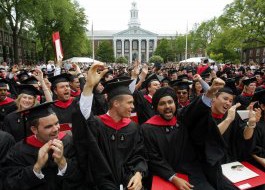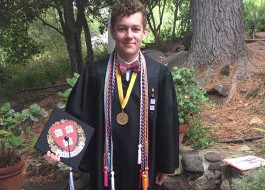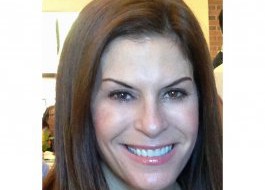 The essay's author is not pictured. Harvard Business School/Facebook
The essay's author is not pictured. Harvard Business School/Facebook
When applying to business school, the essay can make or break your chances of admittance.
Who are you, beyond the GMAT?
To get to know their prospective students, Harvard Business School asked applicants to answer the following question in 2015:
"It's the first day of class at HBS. You are in Aldrich Hall meeting your 'section.' This is the group of 90 classmates who will become your close companions in the first-year MBA classroom. Our signature case method participant-based learning model ensures that you will get to know each other very well. The bonds you collectively create throughout this shared experience will be lasting. Introduce yourself."
The Harbus, HBS's student newspaper, publishes an annual collection of successful answers in "The Essay Guide." One of the best examples of a strong essay, "The Balance Act," from the 2016 edition of the guide, is included below.
The applicant is a woman from the US who worked in manufacturing/engineering product management and operations before applying to business school.
"I've been to Reno, Winnemucca, Salt Lake City, Chicago, Buffalo..." What sounds like a verse from Hank Snow's "I've Been Everywhere" is actually the chain of cities I've crossed four times since 2011. You see, the first engineering position I took after college required that I relocate for new assignments every six months.
If you had peered inside my car during one of those moves, you'd have struggled to guess my age (more than 300 vinyl LPs lay stacked in the trunk), my profession (the back seat was jammed with boxes of cake decorating tools), or why a person with Illinois plates owned a Buffalo Bills football (as my Bills enter the 2016 season now having missed the playoffs for 16 consecutive years, I'm struggling with that one too).
The link behind these seemingly dissimilar interests lay on the dashboard, in a dog-eared page of Sheena Iyengar's "The Art of Choosing." On that page, a Wynton Marsalis quote read: "You need to have some restrictions in jazz. Anyone can improvise with no restrictions, but that's not jazz. Jazz always has some restrictions. Otherwise it might sound like noise."
The thing to know about me is this: my two favorite things are CHAOS and CONTROL. "Get Smart" reference aside; I love rules ("restrictions" for Marsalis), but also disorder. I love routines, but also spontaneity.
Contradictory? Not really. My desire for routine (jigsaw puzzles over coffee every Sunday) and my flair for spontaneity (impromptu urban taco crawls) at times reveal themselves in quite separate pursuits. But more and more, the two combine into structured, yet inventive projects (most recently, a Kanban inventory system for custom cookies in my four-person apartment).
My upbringing built in me the love for "control." My dad, a lawyer and a lifelong coach, taught me to trust rules and fundamentals. I started playing baseball, repeating daily the same basic drills on the batting tee. I taught myself to cook, studying family recipes and following them to a T. I listened to my parents' LPs, memorizing every lyric and mimicking every note on the violin or piano.
Routine ruled my life. And I loved it, particularly as an athlete. I was recruited to the [TOP U.S. MIDWESTERN CITY PRIVATE UNIVERSITY] Softball team, where I continued emphasizing the fundamentals: throwing, glove work, sprints. These fundamentals made the "fun" stuff — making diving catches, throwing people out, winning — possible. Where fans saw graceful, instinctive skill, I saw a series of assessments, decisions, and actions.
This unwavering faith in fundamentals would propel me to success until 2010, when, after 15 years spent perfecting the skills my sport demanded, I hit a slump. To respond, I worked harder at the same drills I had always known. I re-ran weekly our toughest workout (up every stair in the 48,000-seat football stadium) with the expectation that more practice would make me "good" again.
No effort I made led to improvement, however, and I was eventually benched.
I to that point had defined self-worth solely by athletic performance. So when I felt my career ending despite extreme effort, I almost lost faith in those fundamentals.
That same year, though, I had joined a campus group, [NAME OF CAMPUS CHRISTIAN ATHLETE GROUP]. A group leader one day called for someone to bring food to the meetings. Remembering studying family recipes as a kid, I volunteered.
I ended up cooking for [CAMPUS CHRISTIAN ATHLETE GROUP] every week for two years, earning the nickname "Chef [APPLICANT'S LAST NAME, WITH AN 'IE' AT THE END]." I quickly discovered that the thing I loved about softball, I too loved about cooking — that I could learn fundamental "rules" (like throwing a ball, or packing brown sugar) to do something bigger (like winning a game, or baking a killer snickerdoodle).
But I discovered a freedom in the kitchen that I had never experienced as an athlete. I was instinctively substituting an ingredient here, tweaking a step there, to create new recipes. Just as Marsalis and others did with their music, I was taking the cooking rules and now re-arranging them into improvised creations, such as the ever popular "Molson Maple Glazed Donut."
That small change in approach in the kitchen gave me the appetite to improvise, and even explore, elsewhere. It provoked me to take the rotational position that soon sent me packing to new cities every six months. It motivated me to embrace new cultures as I moved, rather than live inside my known rules. It led me to taste stinky tofu in Hangzhou, China, to become the biggest Buffalo Bills fan you'll ever meet, and to try hang gliding in California (I won't be doing that again).
Throughout these adventures, though, I've held onto rules, to traditions. I explore each new city by running its best stairs, to honor those [UNDERGRAD UNIVERSITY] workouts. And I fill each new apartment with my boxes of LPs and cooking supplies.
The rules, the routines are still important — in fact, necessary — for me to create.
That's what brings me here — that mix of rules and improvisation, of control and chaos. I want the rigidity of finance and engineering mixed with the volatility of interacting with real people. I want to study through Case, the perfect marriage of preparation and adjustment. I want to take my existing knowledge of operations in manufacturing and transform it to retail and consumer goods.
I hope you'll each introduce yourselves to me over the next few weeks. You can find me running Harvard Stadium on Fridays or watching the Bills at Bleacher Bar on Sundays, as I learn to combine my existing routines with this new school and new city.
And as we go through TOM, I'll create a miniature cookie "factory" in my kitchen for anyone who wants to practice the basics of production flow. I'm thinking we can make Heath Bar Sandie's.
The editors of the guide provide a brief analysis of the strengths of each essay. For this particular one, they point out that the author nicely incorporates her many interests, including "athletics background, her love for cooking and her regular travel as part of her job."
The author also shows how these facets of her personality make her a good fit for business school.
"Towards the end, the author ties in her theme with the HBS case method by describing the cases as a perfect combination of 'chaos' and 'control' — thus emphasizing, in a very innovative way, how the program will be a perfect fit for her," the guide says.




